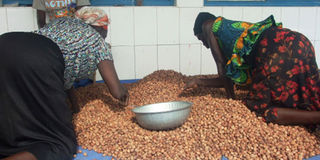Prime
Mayambala seeks to construct shea butter factory in West Nile

Women sort shea nuts in West Nile. PHOTO BY CLEMENT ALUMA
While the economic and cultural values of the shea nut tree have become undoubtedly clear, there are some worrying developments taking place in West Nile that need to be checked.
Locals are destroying the shea nut trees to produce charcoal.
Speaking in Arua before his weekend campaigns, Mr Willy Mayambala, the Independent presidential candidate, said he would construct a shea butter factory to harness revenue and employment for West Nile.
“We shall create nursery beds and get grants for the locals because people of West Nile are experts in re-growing shea nut trees. And we shall need to have fertilisers, irrigation to facilitate faster growth within five years and start reaping,” he said.
Mr Mayambala said there is need for adequate shea nuts to ensure effective value-addition.
He said they would create a group of five people in every village to cater for the seedlings and also set up plantations of shea nut trees.
“This is a blessed region with the shea butter. We can harness a lot of products from it. People should stop cutting them for charcoal and firewood. Once factories are set, youth will be employed and we shall also capture the international market,” he said.
Uganda Export Promotions Board has set a target of supporting and enabling shea nut producers to have at least 200,000 to 500,000 tonnes of shea nut produced by 2022.
Environmental activist Mustafa Gerima said there is need to create awareness on protection of shea nut trees.
Mr Gerima said: “We now have some tree seedlings raised in order to embark on reclaiming them. But in my daily routine of traversing villages where shea nut trees are found, I had the biggest shock when a tree of about 90 years old was freshly cut and chopped for burning bricks.”
Nonetheless, the shea butter oil is facing increasing competition from imported palm oil for edible use, and from widely advertised cosmetics. In 2017, a company, Klaus Fehling started buying the shea nuts for export to the European countries. This opened market for those dealing in shea nuts.
The managing director, Mr Klaus Fehling, said: “It is not a plantation tree. Almost all these trees were not planted. Part of the trees grow naturally on privately-owned farm land. Many grow on communal land. These are mostly prone to illegal logging. But even the trees on private land fall under the ban because cutting them is illegal.”
The shea nut trees thrive on the foothills of Nebbi, Madi Okollo, Yumbe, Moyo and Adjumani districts. Other countries that embrace shea nuts include Ghana, Benin, Chad, Burkina Faso, Cameroon, Central African Republic and Ethiopia.
Mr George Asiku, 76, a resident of Okollo, said shea nut trees produce high quality charcoal.
“Besides charcoal, the shea nut tree produces abundant amounts of sap which are valuable in the gum and rubber industry. But it is unfortunate that this trees are getting extinct,” he said. Poverty has been blamed on the destruction of shea nut trees.
The Moyo District forestry officer, Mr Patrick Drama, said there is need to engage the charcoal dealers to appreciate the value of a single shea nut tree.
“...Let us intensify this [sensitisation] in a way that they are not looked at as criminals but together we can bring them on board to save these trees,” he said.
Shea nuts contain calcium, glucose, fructose and sucrose. Shea butter serves as a moisturiser and is rich in Vitamin A, E and F, among others. It helps sooth, balance and hydrate the skin.




